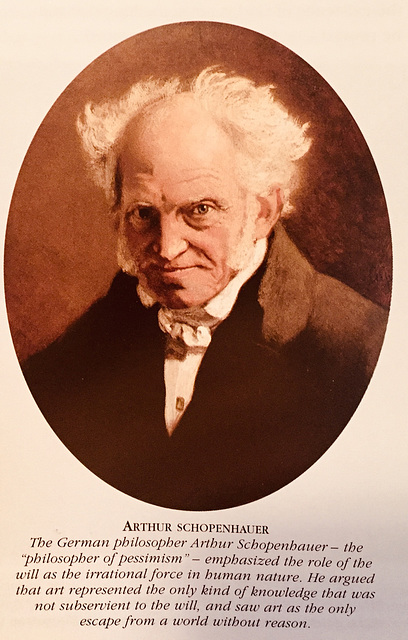Mirror Test
Darwin's old study at Down
Down House
What is a Primitive World
Charles Darwin
Beagle
Beagle
Alfred Wallace, aged 46, in 1869
Charles Darwin
Darwin's study
Darwin
Branch
Man's Oneness with Nature
Hegel
No news is good news
Revolution in Europe
KARL MARX
POLARIZATION OF THE CLASSES
The Means of subsistence
The POWER of IDEAS
ABOVE AND BEYOND
Representation and Reality
THE NATURE OF EXPERIENCE
DECLARATIONS OF THE RIGHTS OF MAN
INTELLECTUALS GATHERING AT THE CAFE D'ALEXANDRE, P…
THE STROMING OF THE BASTIEEL
A LADY AT HER MIRROR, JEAN RAOUX (1720s)
RULED BY THE HEART
YALE UNIVERISTY
Knowledge of the External World
IN THE EYE OF THE BEHOLDER
Denis Diderot
John Locke
VOILA D'AMORE
LEIBNIZ WITH QUEEN SOPHIA CHARLOTTE OF PRUSSIA
FREEDOM OF EXPRESSION
Benedict Spinoza
Checking the facts
THE PICTURE THEORY OF MEANING
See also...
Keywords
Authorizations, license
-
Visible by: Everyone -
All rights reserved
-
19 visits
The LEGACY of SCHOPENHAUER


AN UNPARALLELED DEPTH OF INSIGHT INTO THE HUMAN CONDITION
Erhard Bernstein has particularly liked this photo
- Keyboard shortcuts:
Jump to top
RSS feed- Latest comments - Subscribe to the comment feeds of this photo
- ipernity © 2007-2024
- Help & Contact
|
Club news
|
About ipernity
|
History |
ipernity Club & Prices |
Guide of good conduct
Donate | Group guidelines | Privacy policy | Terms of use | Statutes | In memoria -
Facebook
Twitter

Perhaps the most extensive field in which Schopenhauer’s influence made itself felt was that of the novel. The supreme Russian novelist Telstoy and Turgenev; the great French writers Proust and Zola; perhaps the greatest of all German novelists, Thomas Mann; and in English the novelist Hardy and Conard; all acknowledged that their own books had been actively nourished by their reading of Schopenhauer. The philosopher is even mentioned by name in some of their novels, for instance in Tolstoy’s Anna Karenina (1877), and in Hardy’s ‘Tess of the D’Urbervilles’ (1891). What may be claimed as the best all short story writers -- Maupassant, Chekhnov, Maugham, and Broges -- reveal similar influence. And this extraordinary effect of Schopenhauer’s on creative writers was to continue well into the 20th century. He is mentioned by name in more than one of Chekhov’s plays, and after Chekkov’s his influence is felt in the plays of Bernard Shaw, Pirandello, and Samuel Beckett. It brushed the wings of even the greatest of 20th century poets, Rilke, and T.S. Eliot.
There is no other philosopher, at least since Locke, of whom anything like this can be said. Not even Marx, whose effect on art and artists was very great, can count so many stars of such magnitude among those whose works he influenced. And of course the influence was felt by philosophers was Nietzsche, the outstanding philosopher of the 19th century after Schopenhauer’s death, said that it was the reading of Schopenhauer that had turned him into a philosopher. And in the first part of the 20th century Wittgenstein began his philosophizing from a starting point provided to him by Schopenhauer.
The reasons for his unique range of influence are many and complex, but perhaps chief among them are Schopenhauer’s combination of an unparalleled depth of insight into the human condition with a literary style of exceptional quality ~ Page 145
Sign-in to write a comment.